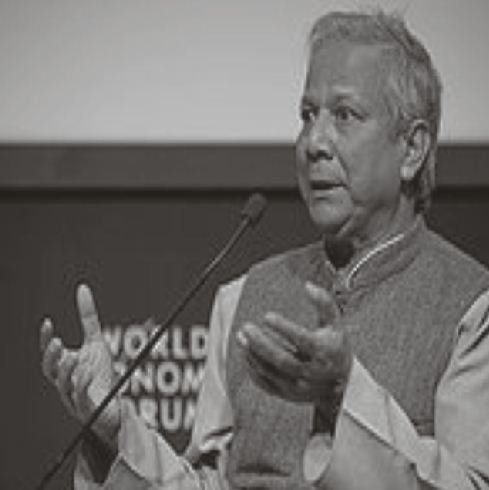|
Muhammad Yunus: Bangladeshi economist and founder of the Grameen Bank, an institution that provides Microcredit (small loans to poor people possessing no collateral) to help its clients establish credit worthiness and financial self-sufficiency. In 2006 Yunus and Grameen received the Nobel Prize for Peace. Yunus himself has received several other national and international honors. He previously was a Professor of Economics where he developed the concepts of microcredit and microfinance. These loans are given to entrepreneurs too poor to qualify for traditional bank loans. He is the author of “Banker to the Poor” and a founding board member of Grameen America and Grameen Foundation. In early 2007 Yunus showed interest in launching a political party in Bangladesh named Nagareek Shakti (Citizen Power), but later discarded the plan. He is one of the founding members of Global Elders. The Grameen Bank is a Microfinance organization and community development bank started in Bangladesh that makes small loans(known as microcredit or "grameencredit") to the impoverished without requiring collateral. The word "Grameen" is derived from the word "gram" and means "rural" or "village" in Bangla language. The system of this bank is based on the idea that the poor have skills that are under-utilized. A group-based credit approach is applied which utilizes the peer-pressure within the group to ensure the borrowers follow through and use caution in conducting their financial affairs with strict discipline, ensuring repayment eventually and allowing the borrowers to develop good credit standing. The bank also accepts deposits, provides other services and runs several development-oriented businesses including fabric, telephone and energy companies. Another distinctive feature of the bank's credit program is that the overwhelming majority (98%) of its borrowers are women. The origin of Grameen Bank can be traced back to 1976 when Professor Muhammad Yunus, a Fullbright scholar at Vanderbilt University and Professor at University of Chittagong, launched a research project to examine the possibility of designing a credit delivery system to provide banking services targeted to the rural poor. In October 1983, the Grameen Bank Project was transformed into an independent bank by government legislation. The organization and its founder, Muhammad Yunus, were jointly awarded the Nobel Peace Prize in 2006; the organisation's Low-cost Housing Programme won a World Habitat Award in 1998. In 1976, during visits to the poorest households in the village of Jobra near Chittagong University, Yunus discovered that very small loans could make a disproportionate difference to a poor person. Jobra women who made bamboo furniture had to take out usurious loans for buying bamboo, to pay their profits to the moneylenders. His first loan, consisting of US$27.00 from his own pocket, was made to 42 women in the village, who made a net profit of BDT 0.50 (US$0.02) each on the loan. Accumulated through many loans, this vastly improving Bangladesh's ability to export and import as it did in the past, resulting in a greater form of globalization and economic status. Dr. Akhtar Hameed Khan, founder of the Pakistan Academy for Rural Development (now Bangladesh Academy for Rural Development), is credited alongside Yunus for pioneering the idea. From his experience at Jobra, Yunus, an admirer of Dr. Hameed, realized that the creation of an institution was needed to lend to those who had nothing. While traditional banks were not interested in making tiny loans at reasonable interest rates to the poor due to high repayment risks, Yunus believed that given the chance the poor will repay the borrowed money and hence microcredit could be a viable business model.
Yunus finally succeeded in securing a loan from the Government Janata Bank to lend it to the poor in Jobra in December 1976. The institution continued to operate by securing loans from other banks for its projects. By 1982, the bank had 28,000 members. On 1 October 1983 the pilot project began operations as a full-fledged bank and was renamed the Grameen Bank (Village Bank) to make loans to poor Bangladeshis. Yunus and his colleagues encountered everything from violent radical leftists to the conservative clergy who told women that they would be denied a Muslim burial if they borrowed money from the Grameen Bank. As of July 2007, Grameen Bank has issued US$ 6.38 billion to 7.4 million borrowers. To ensure repayment, the bank uses a system of "solidarity groups". These small informal groups apply together for loans and its members act as co-guarantors of repayment and support one another's efforts at economic self-advancement. The Grameen Bank started to diversify in the late 1980s when it started attending to unutilized or underutilized fishing ponds, as well as irrigation pumps like deep tubewells. In 1989, these diversified interests started growing into separate organizations, as the fisheries project became Grameen Motsho (Grameen Fisheries Foundation) and the irrigation project became Grameen Krishi(Grameen Agriculture Foundation). Over time, the Grameen initiative has grown into a multi-faceted group of profitable and non-profit ventures, including major projects like Grameen Trust and Grameen Fund, which runs equity projects like Grameen Software Limited, Grameen Cyber Net Limited, and Grameen Knitwear Limited, as well as Grameen Telecom, which has a stake in Grameen phone(GP), biggest private sector phone company in Bangladesh. The Village Phone (Polli Phone) project of GP has brought cell-phone ownership to 260,000 rural poor in over 50,000 villages since the beginning of the project in March 1997. The success of the Grameen model of microfinancing has inspired similar efforts in a hundred countries throughout the developing world and even in industrialized nations, including the United States. Many, but not all, microcredit projects also retain its emphasis on lending specifically to women. More than 94% of Grameen loans have gone to women, who suffer disproportionately from poverty and who are more likely than men to devote their earnings to their families. For his work with the Grameen Bank, Yunus was named as an “Ashoka: Innovators for the Public Global Academy Member in 2001”. |
Categories
All
Social Work Learning Academy50,000 HR PROFESSIONALS ARE CONNECTED THROUGH OUR NIRATHANKA HR GROUPS.
YOU CAN ALSO JOIN AND PARTICIPATE IN OUR GROUP DISCUSSIONS. MHR LEARNING ACADEMYGet it on Google Play store
|
SITE MAP
SiteTRAININGJOB |
HR SERVICESOTHER SERVICESnIRATHANKA CITIZENS CONNECT |
NIRATHANKAPOSHOUR OTHER WEBSITESSubscribe |
MHR LEARNING ACADEMY
50,000 HR AND SOCIAL WORK PROFESSIONALS ARE CONNECTED THROUGH OUR NIRATHANKA HR GROUPS.
YOU CAN ALSO JOIN AND PARTICIPATE IN OUR GROUP DISCUSSIONS.
YOU CAN ALSO JOIN AND PARTICIPATE IN OUR GROUP DISCUSSIONS.
|
|








 RSS Feed
RSS Feed





